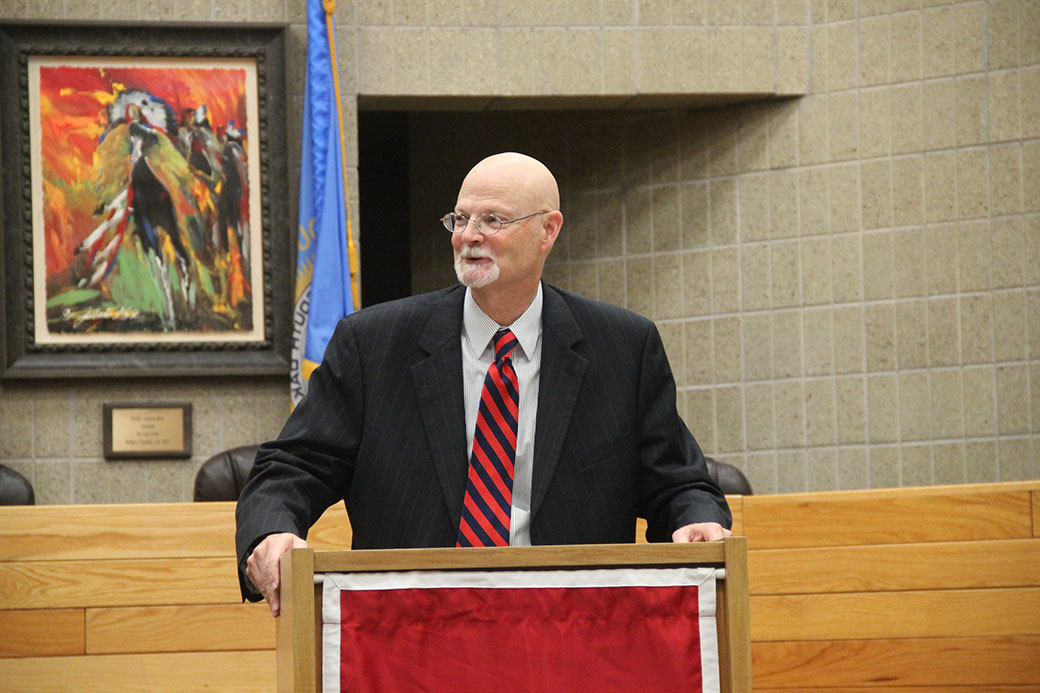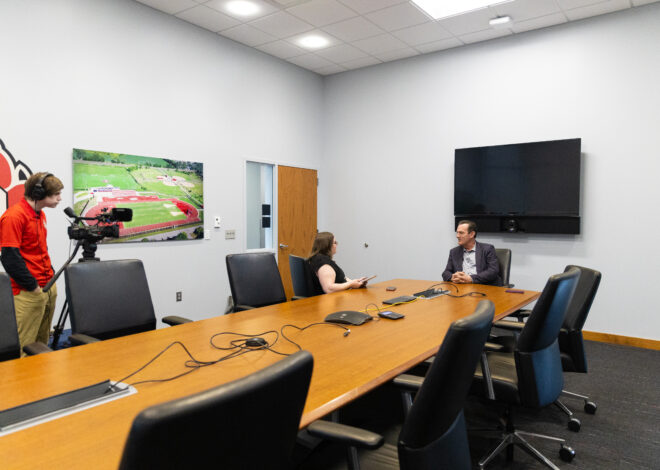
Changes coming to South Dakota bar exam
The University of South Dakota’s School of Law, among other law schools around the country, will be affected by multiple changes taking effect in February to the bar exam administered to students upon completion of a law degree.
South Dakota’s bar exam is the Multistate Bar Examination (MBE) and is the most widely used exam throughout the U.S., said Thomas Geu, dean of the USD School of Law.
The cut score, or the minimum passing grade, will increase to 135 from 130, and students will need to receive a passing score in every category instead of just passing the overall cut score, Geu said.
In addition, the category of civil procedure, or the rules a court has to follow, will also be a required part of the multiple choice test.
The test is offered for graduates in February and again in July.
The MBE tests students over more than 200 multiple choice questions and also includes essay questions and a performance test designed to test students’ knowledge of different aspects of law.
Each state sets its own cut score for the exam, and Geu said South Dakota’s is similar to other schools in the region.
While the base questions on the MBE are exactly the same in all states, each state also has their own unique category of questions. In South Dakota, that category contains questions regarding Indian law.
Jennifer Harvey, graduate student and president of the Student Bar Association, said South Dakota’s customized category is pertinent to practicing law in this state.
“The individuals who are going to practice in South Dakota should know something about Indian law,” Harvey said.
The South Dakota Supreme Court appoints members of the State Board of Bar Examiners who administer and construct the exam, Geu said.
Frank Pommersheim, a professor at USD, is a part of the State Board of Bar Examiners and teaches Indian law.
Having a professor who has a say in what South Dakota will include in the Indian law category has been helpful, Harvey said.
“Given the fact that our professor helps draft the Indian law question, I think that helps,” Harvey said. “If you take Indian law, then you kind of know what he looks at when he’s going to write it.”
In regard to law students taking the exam, Geu said USD’s School of Law is known for its consistently high pass rates.
“We traditionally have been higher than other schools’ pass rates,” Geu said. “For example, we are as high or higher than Montana, North Dakota and some of the other schools that we know of in the region.”
The pass rate has been above 90 percent for nine out of the last 16 years, Geu said. However, the pass rate dropped to only 75 percent in 2014, similar to other local law schools.
Geu said he is not happy with the current pass rate but expects it to rise again in the future.
However, recent statistics compiled by a the GoLocalPDX news organization in Oregon ranked South Dakota’s bar exam as the easiest to pass.
Jason KW Krause, a 2012 graduate from USD Law who is now an attorney in Sioux Falls, said the bar exam was the hardest thing he’s ever done.
Krause thinks the “easy to pass” reputation stems from South Dakota’s continually high pass rate, and the exam is no easier in this state than elsewhere.
“The hardest bar exam in the nation is the hardest bar exam that any test taker takes,” Krause said. “I don’t think it matters where you actually take it. The test itself is the same from state to state.”
According to the study, California’s bar exam has a reputation for being the hardest in the nation, contributing to its low passing rate. Although, Krause said he knows people who failed South Dakota’s bar exam but passed California’s.
As a faction to the students’ success on the bar exam, Geu said faculty members and small class sizes are key components.
“Our typically high pass rate is certainly an indication of the quality of our faculty, and as the Princeton Review says, the fact that our faculty really attempt to make the courses practical,” Geu said.
Krause said studying hard, paying attention in his classes and taking the summer preparation course all contributed to his passing of the exam.
Some clarity in how students will be graded would be helpful to future test takers, Krause said.
“Transparency in grading would be a big thing for people that are getting ready to take that test,” Krause said. “You know that the (multiple choice) portion is worth half and the (essay and performance test) roughly account for the other half, but you don’t know what you need to get on any part in order to pass.”
Despite the inconsistency with the GoLocalPDX report and USD’s high pass rates, the School of Law is still considered a top contender.
Recently, the Princeton Review released its annual report on the top law schools in the nation. USD Law was ranked as the 5th Best Value College in the United States.
“This year, it talks about the intimacy of our professors and students, meaning that we have a close-knit community. It notes once again that we have a faculty with great expertise,” Geu said.
Professors, especially at the graduate level, “have to want to be there,” Krause said, because of Vermillion’s size and remote location.
“From a bang-for-your-buck perspective, there isn’t a school around that’s better than USD,” Krause said. “For the caliber of teachers and professors that you get, for what you’re paying, it doesn’t get any better than that.”
(Photo: Thomas Geu, dean of the University of South Dakota School of Law, introduces a guest speaker at a law lecture in the Fall of 2013. The Princeton Review ranked the USD School of Law as the 5th Best Value College in the nation. File photo / The Volante)

